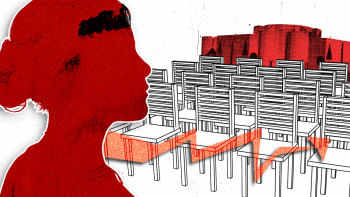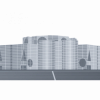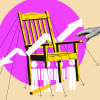The parliament of 1973 set an example we need to follow

Bangladesh's parliamentary governance system owes a foundational debt to the very first parliament established in 1973. The inaugural session began on April 7 of that year and marked a significant historical moment. Bangabandhu Sheikh Mujibur Rahman's extraordinary speech that day set the tone for the parliament's future. His vision was clear: to create a model parliament worthy of emulation. This ambition extended beyond mere words. He introduced practices and championed ideas that remain highly relevant today.
Bangladesh as a land boasts a rich parliamentary heritage that stretches back over a century and a half. The tradition began in 1862, laying the groundwork for parliamentary democracy in the region. This long and dynamic process, encompassing the British Raj, the Pakistani period, and the early years of independent Bangladesh, has significantly shaped the country's current parliamentary system.
The 1973 parliament emerged from an election in which, while the Awami League dominated the vote, the process itself was participatory and competitive. The newly formed Jatiya Samajtantrik Dal (JSD) and established forces like the National Awami Party (Bhashani), NAP (Muzaffar), Communist Party of Bangladesh (CPB), and others actively contested the polls. The Awami League secured 293 out of 300 seats, with the remaining seats being divided amongst other parties and independents.
It's crucial to remember that the primary function of the members of the parliaments is not development, which is the government's responsibility, but rather the creation of sound legislation and ensuring the government's proper execution of those laws.
The presence of an opposition voice was evident from the outset. Ataur Rahman Khan, a senior figure, served as a vocal opposition member. This mirrored the 1972 Constitutional Assembly (Gana Parishad) where Suranjit Sengupta stood as the lone opposition member, alongside two independents. Despite their limited numbers, Sengupta and Khan actively engaged in debates in the Gana Parishad and the first parliament respectively. This highlights a key truth—the effectiveness of an opposition doesn't solely depend on numbers; the dedication and commitment of individual members also play a vital role.
While the opposition grew in number in subsequent parliaments, it's worth noting the seemingly greater impact of individual voices in the early years. Suranjit Sengupta's lone voice in the Gana Parishad and Ataur Rahman Khan's with other opposition party members and independent members in the 1973 parliament arguably had a more significant influence than some larger oppositions in later parliaments.
Bangabandhu played a pivotal role in shaping this early parliamentary culture. He recognised the importance of strong opposition, even with his party holding the majority. As both Prime Minister and Leader of the House, he actively encouraged opposition participation to solidify the parliament as a true institution. Bangabandhu was adamant about creating a framework that fostered institutional development within the parliament. He prioritised logical reasoning, philosophical underpinnings, and discussions focused on long-term state-building.
This emphasis on participation and open debate was evident from the very beginning. Parliamentary committees were formed during the inaugural session, and voices from across the political spectrum were heard. Ataur Rahman Khan, representing the opposition, and independent member Manabendra Narayan Larma both delivered significant speeches. These early sessions were demonstrably lively and diverse.
It's important to contrast this with the current perception of limited freedom for independent members. That initial parliament was a space for genuine expression of opinions. Even members of the ruling party openly criticised the government and its ministers.
On June 21, 1974, a debate arose concerning the Health Minister's proposal to relocate PG Hospital from Dhaka to Tangail. The government argued that PG Hospital was originally a temporary arrangement in a hotel facility, and they desired to transfer it to Kumudini Hospital in Tangail. Independent member Abdullah Sarkar, who later joined JSD, strongly opposed the idea. He argued that the relocation would harm both PG Hospital and Kumudini Hospital. Notably, ruling party member Nur Alam Siddiqui sided with Sarkar, and many other members of the ruling party even expressed support through table-banging.
The expectation then was that the government's decision would reflect the views expressed in parliament. This stands in stark contrast to the current situation, where the ruling party often appears to simply endorse the government's pronouncements.
In a healthy parliamentary system, a vibrant exchange of ideas takes centre stage. Backbenchers from all parties–opposition, independents, and even the ruling party–actively engage in debate with the government's frontbench, made up of ministers and senior leadership. This robust back-and-forth is a cornerstone of a functioning democracy. It transcends party affiliation; all members share the crucial responsibility of scrutinising the government's performance. The first parliament of Bangladesh exemplified this principle, demonstrating its success through a lively and effective legislative process.
Beyond individual voices, parliamentary parties also played a significant role in shaping this early parliament. In his inaugural address, Bangabandhu emphasised the importance of pre-parliamentary discussions with MPs from his party. He envisioned a "disciplined" parliament, similar to the British system with its "whipping" practices. The Awami League Parliamentary Party (ALPP) held regular meetings before sessions to discuss issues and allow for internal debate. This practice, unfortunately, seems to have faded in recent times.
Further solidifying its international standing, the parliament hosted distinguished guests. On January 29, 1974, the President of Yugoslavia, Josip Broze Tito, delivered a 12-minute address to the parliament. VV Giri, the President of India, spoke on June 18, 1974, giving a 17-minute speech. This tradition of hosting foreign dignitaries within the parliament began under Bangabandhu's leadership.
In short, the first Bangladeshi parliament marked an ideal beginning. It prioritised open debate, valued individual voices, and fostered a strong sense of institutional purpose.
The later parliaments, however, have deviated from this esteemed past. They have become overly focused on party loyalty and government agendas. It's crucial to remember that the primary function of the members of the parliaments is not development, which is the government's responsibility, but rather the creation of sound legislation and ensuring the government's proper execution of those laws.
A common misconception, both in Bangladesh and elsewhere, is that an MP primarily serves their constituency. However, as Edmund Burke, the 18th-century Anglo-Irish statesman and philosopher, famously stated: "Parliament is not a congress of ambassadors from different and hostile interests… but parliament is a deliberative assembly of one nation, with one interest."
But today, many MPs prioritise re-election campaigns over legislative duties and holding the government accountable. A well-functioning parliament, dedicated to national interests and upholding legislative and governmental accountability, would undoubtedly be a stronger and more successful institution. The first parliament set an example of that tradition; we need to study and follow it properly to carry the torch forward.
As told to Naimul Alam Alvi of The Daily Star.
Dr Jalal Firoj is a researcher and executive director at Center for Parliamentary Studies.
Views expressed in this article are the author's own.
Follow The Daily Star Opinion on Facebook for the latest opinions, commentaries and analyses by experts and professionals. To contribute your article or letter to The Daily Star Opinion, see our guidelines for submission.

 For all latest news, follow The Daily Star's Google News channel.
For all latest news, follow The Daily Star's Google News channel. 











Comments